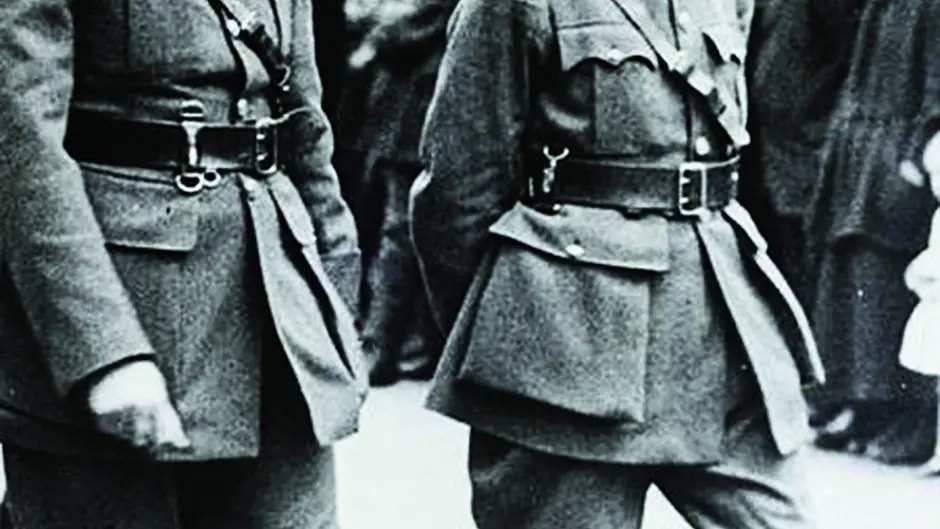BY PÁDRAIG Ó CAOIMH
Richard Mulcahy remains a hugely controversial figure. Pádraig Ó Caoimh’s book – the first biography in more than 25 years, From The Politics of War to the Politics of Peace 1913-1924 – charts Mulcahy’s journey from rebel protagonist to one of the key players in the establishment of the emerging Free State.
DURING the current commemorative process, neatly referred to as the Decade of Centenaries, 2016 – 2026, whereby, in part, the patriots of the revolutionary period are remembered, it is noticeable that one of that number has, thus far, been neglected. As a consequence, the following piece tries to remedy this omission by referencing the influence which some of the people of West Cork had upon him.
For, West Cork certainly did play a prominent part in the Irish-Ireland and politico-military phases of the life of Richard James Mulcahy, erstwhile Chief of Staff of the Irish Volunteers-IRA, and, later, Commander-in-Chief cum Minister for Defence of the nascent Irish army.
In the first instance, during the period, 1904 to 1907, while working in the postal service as an 18 to 21-year-old telegraphist in Bantry post office, he joined the Gaelic League, attending its classes, not alone there, but also in nearby Skibbereen. Unlike the majority of the other young men and women who were drawn to the League for its social more than its cultural aspects, study was by far and away his primary consideration.
As a result of which, he became favourably known to teachers of the calibre of Peadar Ó hAnnracháin (also a former editor of The Southern Star), Conchubhar Ó Muimhneacháin and Éamonn Motherway. Ó hAnnracháin, in particular, was impressed by him – ‘He started speaking it (Irish) when he had only a small amount and he carried on until he mastered it. He was sincere from the start.’
Similarly, Mulcahy’s capacity for autonomous study came to the fore during his visits to Béal Átha’n Ghaorthaigh. For example, he considered the house of Siobhán Ní Chróinín (referred to locally as ‘An tSagairt’ due to her habit of sporting a wide-brimmed, clerical-style hat) as ‘his university.’
Therein, he would write down verses and stories in order the better to commit them to memory. And it was as a result of such endeavours that he became a very close friend of an equally zealous gaeilgeoir, Terence MacSwiney, who accompanied him on a Volunteer training course to Coosan Point, Athlone, in September 1915, and honoured him as his best-man when he, in Volunteer uniform, married Muriel Murphy at Bromyard’s Catholic Chapel, Herefordshire, England, on June 9th, 1917.
But, arguably, the high point of the public recognition of Mulcahy’s Irish-Ireland beliefs occurred on January 21st, 1919, when, speaking exclusively through the medium of our native tongue, the principal medium of the ceremony, he proposed, almost as a nationalist prayer of praise, the acceptance of The Democratic Programme to the first ever sitting of Dáil Éireann.
The following is a translation of part of his speech: ‘This country … is beautiful like God made her, rich from the toil of her people, bright with laughter, blissful with mirth, holy with religion and benevolence.’
Nonetheless, perhaps the most significant encounter of Mulcahy’s entire political life occurred during the post-Rebellion, politico-military phase, while he was interned in an encampment at Frongoch, North Wales. For, it was there that he became a member of a West Cork group, which was under the leadership of Michael Collins (Clonakilty) and Gearóid O’Sullivan (Skibbereen).
Also, at home in Ireland, at the exact same time, Diarmuid O’Hegarty (Skibbereen) and Seán Ó Murhtuile (Leap) were avidly preparing the groundwork, through the clandestine medium of the IRB (Irish Republican Brotherhood), for the implementation of Collins’ plans, in particular the commencement of what would soon become the GHQ of the Irish Volunteers-IRA, and ultimately, after Collins’ death, the Army Council of the pro-Treaty Free State army.
Later on, however, during 1924, Mulcahy was forced to resign his Ministerial brief and to suffer a formal inquiry into his professional conduct because he was considered to have mishandled the IRAO army mutiny, but also because he played a significant part in the resurrection of the army-based IRB, which had gone into decline during the Civil War, and which was now perceived, especially by Kevin O’Higgins, as inimical to the creation of a healthy democracy within the fledgling state.
But, nonetheless, because Mulcahy managed to tenaciously return to the top echelon of political power by taking upon himself the onerous duties of Minister for Local Government and Public Health; the leadership of Fine Gael; Minister for Education (twice) and, in a short-term capacity, Minister for the Gaeltacht – all during the impressively long period, 1927–1961.
It seems reasonable to conclude that, not alone did West Cork play a significant part in the formation of his revolutionary activities, but West Cork also had an overall positive effect on his parliamentary career.









